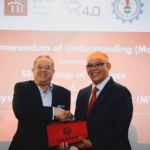Upskilling and reskilling are more than just trendy buzzwords. They have become an essential survival tool, especially amidst the global industry transformation and a health pandemic.
Within several months, Covid-19 has wreaked havoc on businesses large and small. Tanking revenues and huge operations costs have forced businesses to rethink their business models. Many opted to trim their human capital as the term “essential workers” took a new turn. Business optimisation has also become a priority as owners struggle to survive. Do you have what it takes to survive these challenging times?
For most working adults, the thought of reskilling and upskilling has always come in between existing commitments, responsibilities, the capacity to cope and financing. When investing into a professional diploma, degree or postgraduate programme, many would expect some returns, personally and professionally.
“Generally, these “returns” are beyond monetary. In fact, the decision to work and study has various impacts on an individual. At work, it shows your employer how much you care about self-development and in life, it teaches you that you can achieve anything you set your mind to. In the words of famous author Brian Herbert, The capacity to learn is a gift. The ability to learn is a skill. The willingness to learn is a choice,” says Ms Stella Lau, CEO, SEGi Group of Colleges.
In choosing the right study programmes, Lau added that students must ensure that the programmes they choose can equip them with the most relevant skills and knowledge so that they can meet their own needs and the growing needs of the industry.
At SEGi, all study programmes are kept relevant to the industry. SEGi College Subang Jaya’s Faculty of Business and Accountancy Head, Ms Koh Yoke Ling said business students are often exposed to the practical knowledge, skills and strategies that they can apply at their workplace.
“Our coursework and classroom engagements revolve around the latest market developments and that includes topics like Covid-19’s impact on businesses, emerging technologies brought forth by Industry 4.0 and the implications of the US-China trade war. This pushes students to keep themselves updated with all the important happenings around the world,” said Koh.
SEGi’s business programmes are also constantly changing with the times. With Industry 4.0 in the horizon, SEGi had incorporated several Industry 4.0-relevant subjects into the syllabi so that graduates are better equipped with the right business intelligence to cope with new-age challenges. This includes tools, strategies and processes that can help optimise resources, minimise cost and maximise profit through technology adoption and digitalisation. Employees with such skills and knowledge are highly valued by organisations today.
SEGi’s innovative teaching and learning approach also help in enhancing learners’ skills and strengths as they learn various things from guest lecturers from SEGi’s UK partner universities as well as local lecturers. This practice not only enables students to gain reliable local, international perspectives on things, but it also broadens their views and mindset.
In addition, SEGi’s close partnership with industry associates enables them to update their curriculum from time to time, organise networking events and activities like industry talks, forums and engagements, which indirectly helps students develop cross-disciplinary knowledge – making them more creative and innovative when approaching problems.
Apart from well-designed programmes, SEGi also promotes blended learning and innovative financing which provides the much-needed flexibility for students. Adult learners not only enjoy access to SEGi scholarships and attractive rebates and financial assistance, but they are also able to make PTPTN or EPF withdrawals or participate in campaigns like Zero First 6, which enables new students to study first and start paying 6 months later.
SEGi Group of Colleges offers MBA in collaboration with the University of Sunderland as well as Weekend Degree Programmes in the fields of Business Management, Human Resource, Marketing, Advertising & Digital Marketing and Accounting and Finance.





